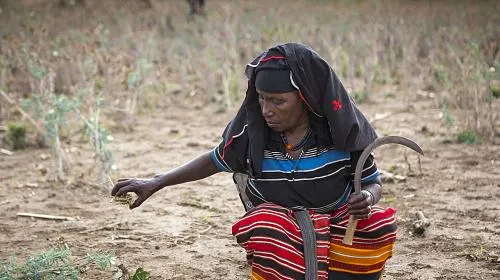Most vulnerable are not left behind when their voices are included in decision-making
GENEVA (May 15, 2019) — During the Global Platform on Disaster Risk Reduction (GPDRR) conference, CARE released a new publication, We Bend, We Do Not Break. The publication features some of the most poor and marginalized who have become leaders in climate change adaptation and disaster risk reduction. It also features inspirational stories of resilience in Ethiopia, Indonesia, Guatemala, Mali, Philippines, and Uganda.
Annisa Srikandini, Country Lead Partners for Resilience Alliance, CARE Indonesia, said: “It is essential that efforts to address disaster risk reduction link local activities with global processes, such as the GPDRR. If we do not directly engage communities, then we fail. We must empower those most vulnerable to disasters and the climate crisis. The publication, ‘We Bend, We Do Not Break,’ personifies hope. We have the solutions and we have examples of success – now we must urgently increase the scale of these efforts.”
The poorest people in the most vulnerable countries suffer disproportionately from disasters and climate change impacts. Disasters wipe out hard-won reductions in poverty and communities are caught in a vicious circle where poverty creates vulnerability, and disasters and climate change impacts increase poverty.
Bart Weijs, Program Manager for Partners for Resilience Alliance, CARE Netherlands said: “Rather than continue to make empty and ill-conceived promises, governments must ensure resources are placed in the hands of those impacted on the ground. If we give the most vulnerable the resources and power to influence, then we can ensure decision-making at all levels is effective and inclusive – and that communities are truly resilient. It is time to stop speaking on behalf of those we’re trying to help, and let them speak for themselves.”
To read full report go to: http://bit.ly/WeBendNotBreak
About Partners for Resilience:
Partners for Resilience (PfR) is an alliance of the Netherlands Red Cross, CARE Nederland, Cordaid, the Red Cross Red Crescent Climate Centre and Wetlands International. PfR advocates for an integrated approach to mitigate disaster risk and enhance livelihoods, particularly by addressing climate change and ecosystem management and restoration. To learn more, please visit https://www.partnersforresilience.nl/en/
About CARE:
Founded in 1945 with the creation of the CARE Package®, CARE is a leading humanitarian organization fighting global poverty. CARE places special focus on working alongside women and girls because, equipped with the proper resources, they have the power to lift whole families and entire communities out of poverty. That’s why women and girls are at the heart of CARE’s community-based efforts to improve education and health, create economic opportunity, respond to emergencies and confront hunger. Last year CARE worked in 93 countries and reached more than 63 million people around the world. Learn more at care.org.
Media Contacts:
Nicole Harris, 404-735-0871 or nharris@care.org
Vanessa Parra, 917-525-0590, vanessa.parra@care.org

